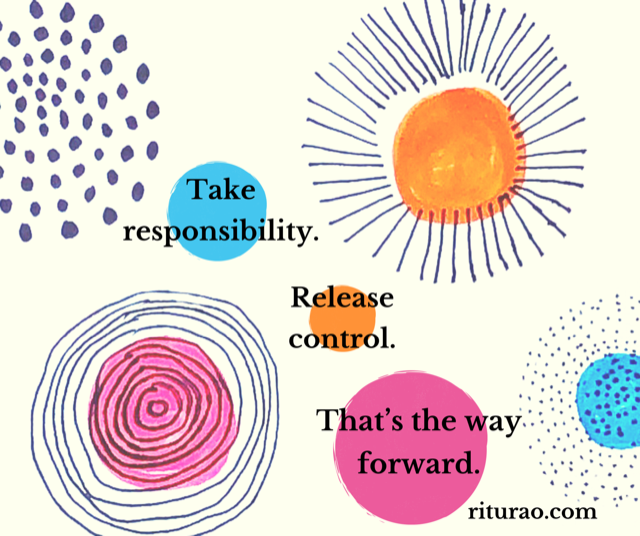
Take responsibility. Release control.
I’ve been mulling over these four words lately. Whether I read philosophy, spirituality, psychology or a romping magic-vampire-werewolves adventure thriller, this concept inevitably presents itself.
One thing is clear, though. Understanding these words is important. Practicing them even more so. Whether out of habit or unintentionally, we are hell bent on doing the exact opposite.
We insist on taking control, and releasing responsibility.
We want things to turn out a certain way (as they “should”), and if they don’t, we’re the victim because someone else—the husband, the wife, the boss, the media, the slow-as-molasses wifi didn’t do what they were supposed to.
It’s understandable, though, and we might even say we’re justified in our stance. Sometimes we are.
Besides, who wants more responsibility? Life is hard enough as it is.
But here’s the thing: taking responsibility—for your actions, your choices, your decisions—is exactly what it takes to make life less hard.
That sounds like a catch-22, but it’s not.
The hero doesn’t win by ducking from the dragon. The hero wins by slaying it.
For you, the hero, this means taking responsibility for your own efforts, for confronting your reality as is, then changing what needs to be changed for the better, with eyes wide open.
It also means releasing control, letting go of expectations of how things should turn out. It means not letting the intense desire—and the worry and struggle—cloud your thinking and steep you in misery. It means proceeding with however best you can in the face of uncertainty, because the fact is, life is uncertain.
It means to take aim, but understand that you may not hit the mark.
Which is okay, because you can work to better your aim. Chances are you’ll get closer and closer.
When things fall apart, we can spend our energy sorting things out and refine our aim rather than sink in the chaos of despair. That’s the responsible thing to do, even if done slowly, reluctantly, tentatively.
In the longer term, we gather more strength this way, we are less likely to crumble in the face of difficulties, and learn to navigate the world more confidently.
It’s the way forward, and the way forward is the way through.
Leave a Reply